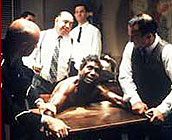|
|
|
|
Black
and White
|
 |
|
The 1959 case of Max Stuart in Adelaide is certainly compelling. An Aborigine who was arrested and then seemingly confessed to the rape and murder of a young girl, Max spent an agonising time in jail while his small-time lawyers, David O'Sullivan and Helen Devaney, fought valiantly against a forbidding establishment. The issues of institutionalised racism raised by the story are still with us today. And there is an even more direct link with the present in the person of Rupert Murdoch, who turned the event into one of the first Australian trials-by-media in the pages of the Adelaide News. But is there a film in all this? As often happens in cinematic dramatisations of legal cases, the human-interest factor lags well behind the cut-and-thrust of courtroom intricacies, which is the sort of information better handled in print. Black and White often seems constrained by historical realities. The film tries hard to create a character-based drama, but never quite gets there. The sometimes questionable ethics of David (Robert Carlyle), putting Max at risk even though he is scarcely qualified to take the matter to the highest courts of appeal, are hardly explored. His tetchy relationship with Helen (Kerry Fox) has none of the screwball sparkle of James Stewart and Arthur O'Connell in Anatomy of a Murder (1959) or even Ashley Judd and Morgan Freeman in High Crimes (2002). Max (David Ngoombujarra) is a complex figure, and the film commendably respects this complexity. His drinking and libido figure crucially in the plot. The central ambiguity of the case – namely, why he consented to signing a damning confession of guilt – hints at not only the strong-arm tactics of whitefella law, but also the difficult position of this man forced to negotiate a culture, language and values not his own. Louis Nowra's screenplays are sometimes rather lumbering, old-fashioned contraptions, and Black and White is no exception. An attempt to create a Rashomon-style effect, visualising different accounts of the police interrogation of Max, is heavily laboured. As in Nowra's previous collaboration with director Craig Lahiff, the bizarre Heaven's Burning (1997), a taste for '50s Hollywood melodrama is evident in the presentation of prosecution lawyer Chamberlain (Charles Dance), glowering darkly while he tinkles his classical piano amidst stately furnishings. The result, however, is merely a crude, cheap shot at a conservative villain. The film often alights on fascinating details and historical figures, such as Strehlow (Petru Gheorgiu), a rare academic of the period with an intense understanding of Aboriginal society, and Father Tom Dixon (Colin Friels), who straddles different cultures and has his own skeleton in the closet. But these characters, as well as the cagey Murdoch (Ben Mendelsohn), are whisked away too soon. Nowra and Lahiff are finally more intent on unveiling the banal irony of their title – that the truth is not all black and white – than on trying to convey an in-depth sociological insight. MORE Nowra: Radiance, Map of the Human Heart © Adrian Martin October 2002 |
![]()